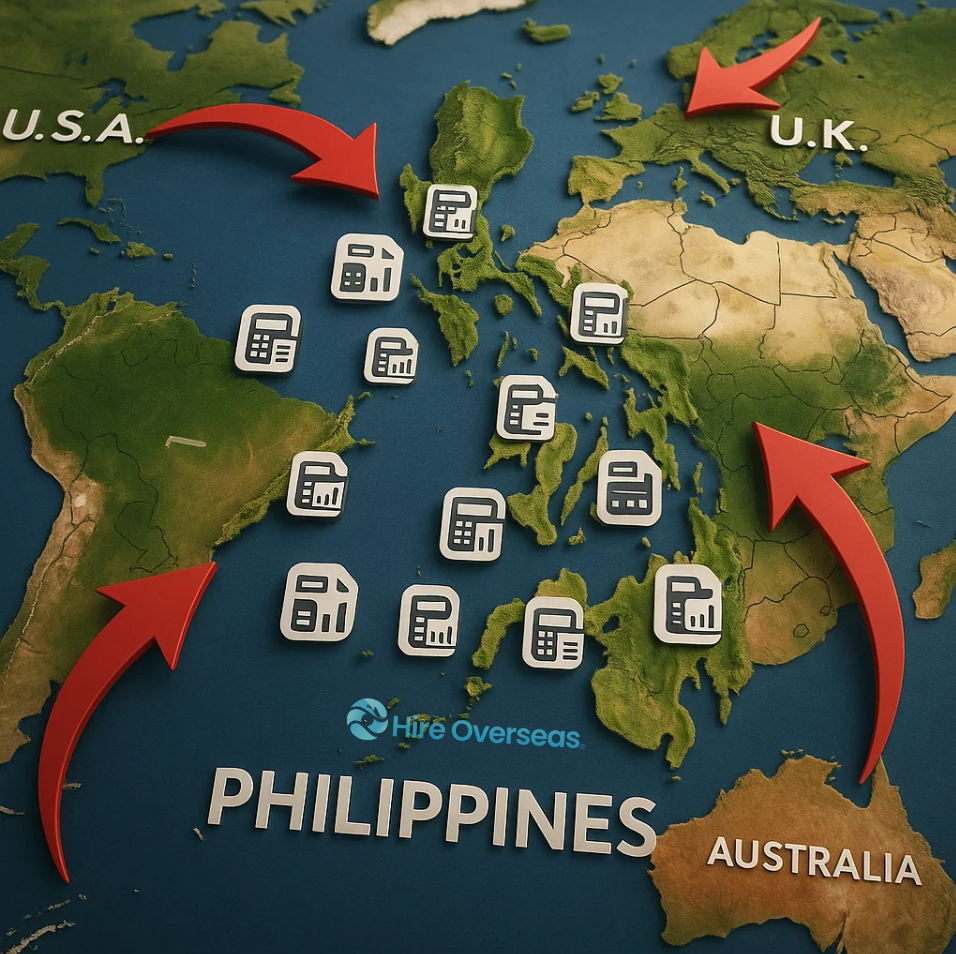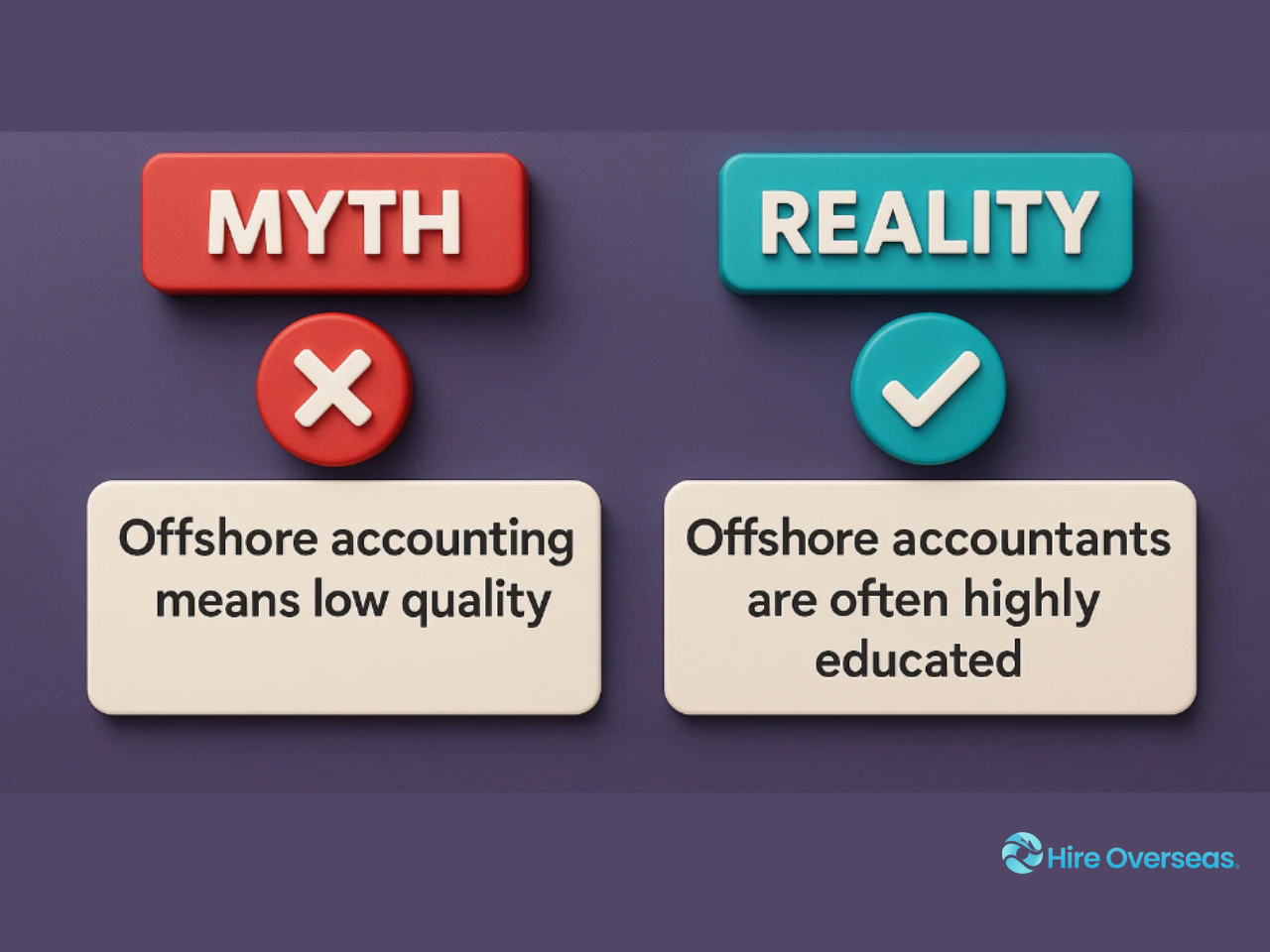Offshore Accounting: The Complete Guide for CPA Firms and Businesses in 2025

Offshore accounting is no longer just a cost-saving tactic—it’s a strategic solution for CPA firms and businesses facing rising costs, talent shortages, and increasing client demands. By tapping into global talent, firms can expand capacity, improve turnaround times, and strengthen service delivery.
This guide explores everything you need to know about offshore accounting: the services available, why adoption is growing, the top global destinations, and how to build a high-performing offshore accounting team.
What Is Offshore Accounting?
Offshore accounting refers to the practice of outsourcing accounting, bookkeeping, and financial tasks to professionals in another country. Unlike general outsourcing, this model focuses specifically on financial operations, compliance, and reporting.
Businesses often choose this approach to access specialized expertise, improve turnaround times, and save significantly on labor costs. In simple terms, offshore accountants act as an extension of your in-house team—handling everything from payroll and bookkeeping to offshore tax preparation and compliance support.
Key Services Offered by Offshore Accountants
An offshore accountant or dedicated team can handle a wide spectrum of responsibilities, freeing up your in-house staff to focus on higher-value activities like advisory and client management. Depending on your firm’s goals, services typically include:
Bookkeeping & Financial Reporting
Offshore teams manage day-to-day accounting tasks such as transaction recording, account reconciliations, and financial statement preparation. With meticulous attention to detail, they ensure that books remain up-to-date and accurate, giving firm leaders and clients reliable financial data for decision-making.
Payroll Processing
Payroll can be time-consuming and error-prone if handled in-house. Offshore accountants streamline the process by managing employee salaries, deductions, tax filings, and compliance with local laws. This ensures timely, accurate payroll while relieving your team of administrative burdens.
Offshore Tax Specialists
From routine tax compliance to advanced planning, offshore tax specialists provide end-to-end support. They help firms manage tax returns, calculate liabilities, optimize tax strategies, and assist with offshore tax preparation, ensuring accuracy while keeping firms compliant with complex and ever-changing regulations.
Audit Support
Offshore accountants can prepare key documentation, perform reconciliations, and conduct pre-audit checks that make audits smoother and more efficient. Their support reduces the workload on local teams while ensuring auditors have everything they need for a thorough review.
Management Accounting
Going beyond compliance and recordkeeping, offshore professionals can provide insights into business performance through budgeting, forecasting, variance analysis, and financial modeling. This empowers firm leaders to make informed, strategic decisions backed by accurate financial data.
Why Offshore Accounting Is Growing
The concept of accounting offshoring has entered a phase of significant expansion, and for good reason. CPA firms around the world — from boutique practices to large enterprises — face mounting challenges: soaring operational costs, dwindling local talent pools, and an imperative to deliver superior service amid tightening competition.
Here’s why building an offshore team for accountants has become a strategic imperative:
1. Massive Cost Savings
Many CPA firms report 50–70% savings on staffing costs and 30–50% reductions in overhead expenses by leveraging offshore accounting services, effectively slashing salary, benefits, and infrastructure expenditures.
Here’s a real example:
- a boutique firm in Texas cut its annual staffing costs from US $240,000 to around US $150,000—saving over 60%, while retaining high-quality output. Source: Mindspace Outsourcing
- Offshore accounting providers often advertise up to 70% employment cost savings, reinforcing the practical financial gains for Western firms. Source: CPA Directory
2. Rapid Acceleration in Adoption
According to AICPA’s 2023 National MAP Survey, of over 1,100 participants:
- 25% already outsource to offshore teams.
- Another 12% are planning to start offshoring soon.
- Industry data suggests that more than 60% of U.S. accounting firms have on-boarded offshore staff, with this trend growing around 15% annually.
3. A Hyper-Competitive Offshore Ecosystem — Especially in the Philippines
The Philippines dominates the business process outsourcing (BPO) space, generating an estimated US $38.7 billion in 2024, and continues to be a leading global hub for finance-related offshoring.
- The industry is projected to grow steadily with 7% annual growth, reaching up to 2.5 million jobs and US $59 billion in revenue by 2028.
- With a robust workforce of over 1.8 million professionals, the sector is transitioning beyond traditional low-margin roles — shifting toward high-value services including accounting, data analytics, cybersecurity, and technology.
4. Skilled, Culturally Aligned Workforce
- There are approximately 200,000 registered Certified Public Accountants in the Philippines (as of 2023), many with credentials and experience from global audit and finance firms.
- English proficiency is a critical advantage — the Philippines consistently ranks among the top countries in Asia (second only to Singapore) in the EF English Proficiency Index, and a 2023 survey reported 47% of respondents confident in their English fluency.
5. Scalability, Focus, and Fast Turnaround
Offshore teams allow firms to:
- Scale operations quickly, especially during peak periods like tax season, without incurring infrastructure or hiring overhead.
- Offload routine tasks (e.g., bookkeeping, payroll, reconciliations) so senior U.S. or U.K. staff can concentrate on advisory, client relationships, and strategic services.
- Benefit from overnight workflows — with teams in other time zones progressing tasks while local offices sleep, accelerating client turnaround.
Why This Matters for Your Firm
These figures and trends underscore that accounting offshoring is no longer just a cost-saving tactic, it’s a competitive differentiator. Whether you’re seeking to optimize margins, alleviate talent shortages, or enhance service delivery, building an offshore team of accountants—particularly in high-value hubs like the Philippines—offers a compelling, proven path.
Offshore Accounting in the Philippines

Among global destinations for offshoring accounting services, the Philippines stands out as a trusted partner for CPA firms and businesses. What makes it unique is not just the financial advantage, but also the depth of talent, cultural compatibility, and long-standing reputation for reliability.
Key Benefits of Offshore Accounting in the Philippines
Cost-Effective Expertise
Filipino accountants bring strong technical skills at a significantly lower employment cost compared to local hires. This efficiency allows firms to reduce overhead while maintaining the same—if not higher—standards of accuracy and professionalism.
Strong English Proficiency
Clear communication is critical in finance, and Filipino professionals are recognized globally for their fluency in English. This ensures seamless collaboration across teams and smooth interaction with clients worldwide.
Time Zone Advantage
Working across different time zones gives firms in the U.S., U.K., and Australia the ability to extend operations. While local teams rest, offshore staff in the Philippines continue with reconciliations, reporting, and tax preparation—creating a near 24/7 productivity cycle.
Proven Reliability with Global Firms
From small CPA practices to large accounting firms, organizations across the globe rely on offshore accountants in the Philippines for bookkeeping, compliance, and tax-related services. The country has built a reputation for delivering consistent, dependable results that foster long-term partnerships.
Why It Matters
Choosing offshore accounting in the Philippines is not only about lowering costs—it’s about accessing a skilled workforce, strengthening client service, and scaling with confidence.
For companies asking, “Where should we start with offshore accounting?”, the Philippines is often the first and most effective answer. It combines cost efficiency, a skilled workforce, and operational advantages that few other regions can match.
Learn more about building teams in the Philippines: Outsourcing to the Philippines »
More Popular Offshore Accounting Destinations
India – Scale and Technical Depth
With decades of outsourcing experience, India offers large-scale teams with deep expertise in bookkeeping, tax processing, and compliance. It’s a cost-efficient option for firms needing high-volume support, particularly for tax preparation and audit assistance.
Latin America – Nearshore Convenience
For U.S.-based firms, Latin America offers the benefit of time zone alignment and real-time collaboration. While costs may be slightly higher than in Asia, the proximity and cultural familiarity make it attractive for firms seeking fast communication and minimal scheduling challenges.
South Africa – Skilled and Culturally Aligned
South Africa combines competitive labor costs with strong English proficiency and advanced financial training. Many South African professionals have international certifications and experience with global accounting firms, making them a solid choice for specialized finance roles.
How to Build a High-Performing Offshore Accounting Team
A successful offshore accounting team doesn’t happen by accident—it’s built with intention, structure, and the right partnerships. To unlock the full value of offshore talent, firms must go beyond simply hiring accountants abroad. The key is to define clear roles, choose the right location, and create systems that foster collaboration and accountability.
With the right approach, your offshore team can deliver the same quality, scalability, and reliability as an in-house department—while giving your firm a competitive edge.
Here’s a step-by-step guide to getting started:
1. Identify the Roles You Need
Begin by mapping out the specific functions your offshore team will cover. Do you need:
- Bookkeepers for transaction recording, reconciliations, and reporting?
- Accountants for general ledger management and month-end close?
- Tax specialists for compliance and offshore tax preparation?
- Or a full offshore team covering bookkeeping, tax, audit support, and management accounting?
Clarity at this stage ensures you hire the right professionals and avoid role overlap or gaps.
2. Choose the Right Country
The “best” offshore location isn’t universal—it depends entirely on your firm’s unique needs. Instead of asking “Which country is cheapest?”, it’s more strategic to ask:
- Do you need accountants who can work in real-time with your team?
- Is specialized expertise (tax, audit, industry-specific skills) more important than cost savings?
- Are you focused on long-term scalability, or filling immediate staffing gaps?
- How critical is cultural alignment and communication for your clients and team?
By answering these questions first, you can narrow down which region makes the most sense for your firm. Some prioritize time zone alignment to allow for daily collaboration. Others focus on cost efficiency to expand margins. And many firms create hybrid teams, using multiple regions to balance cost, skill, and responsiveness.
The key is to evaluate your priorities clearly, then align with a location that supports both your short-term needs and long-term growth strategy.
3. Pick Your Engagement Model
Decide how you want to manage your offshore accountants:
Once you’ve identified the roles and the right country, the next step is deciding how to engage your offshore accountants. There are two main approaches, each with its own advantages:
🔹 Direct Hire
You recruit and manage offshore staff yourself. This gives you full control over workflows, schedules, and team culture. However, it also means taking on all responsibilities for payroll, compliance with local labor laws, HR support, and ongoing administration. For smaller firms without an international HR setup, this can quickly become complex and resource-heavy.
🔹 Through an Offshore Accounting Firm or Partner
This option streamlines the process. An outsourcing partner handles sourcing, vetting, payroll, compliance, and HR—so you can focus on client work and firm growth. It’s flexible, scalable, and significantly reduces administrative overhead.
That’s exactly where Hire Overseas comes in. Instead of juggling recruitment, payroll, and compliance across multiple countries, Hire Overseas connects you with fully vetted offshore accountants and manages all back-office responsibilities on your behalf. From onboarding and payroll to HR and benefits, everything is handled, giving you the advantages of a global team without the hassle.
Whether you need one offshore accountant or a fully dedicated offshore accounting team, Hire Overseas provides a plug-and-play model that ensures you scale with confidence and ease.
4. Set Up Onboarding and Training
Your offshore team needs the same clarity and resources as your in-house team. Effective onboarding includes:
- Training on your accounting processes, reporting standards, and tools (e.g., QuickBooks, Xero, NetSuite).
- Clear documentation of workflows and client expectations.
- Shadowing opportunities with senior staff to accelerate learning.
The more structured your onboarding, the faster your offshore accountants become productive and aligned with your standards.
5. Integrate Them into Your Culture
High-performing teams thrive on shared values and collaboration. Treat offshore accountants as part of your core team by:
- Including them in team meetings and client updates.
- Using shared chat platforms (Slack, Teams) for daily interaction.
- Recognizing contributions and celebrating wins together.
This creates stronger engagement, reduces turnover, and builds a sense of belonging across borders.
6. Track KPIs and ROI
Finally, success must be measured. Establish clear metrics to monitor the performance and ROI of your offshore accounting team, such as:
- Cost savings achieved compared to local hiring.
- Turnaround times for bookkeeping, payroll, or tax returns.
- Error rates and compliance accuracy.
- Capacity growth (how much additional client work your firm can now handle).
Regularly reviewing these KPIs helps ensure continuous improvement and demonstrates the value of your offshore strategy to stakeholders.
For strategies on keeping offshore accountants engaged and aligned, check out our guide on Managing Remote Teams »
How Hire Overseas Supports Offshore Accounting
Building an offshore accounting team shouldn’t be complex. Hire Overseas makes it simple—sourcing skilled accountants, managing payroll and compliance, and supporting your team so you can focus on growth.
Whether you need one offshore accountant, a tax compliance specialist, or a fully integrated finance team, we connect you with top talent from leading hubs like the Philippines, India, Latin America, and South Africa.
Here’s how we help firms scale with offshore accounting:
✅ Skilled Talent Sourcing & Vetting
We deliver fully vetted accountants with expertise in:
- Bookkeeping, reconciliations, and financial reporting
- Payroll, accounts payable/receivable, and tax compliance
- Audit support, management accounting, and multi-entity reporting
- Tools like QuickBooks, Xero, NetSuite, and more
Each candidate is screened for technical skills, certifications (CPA, ACCA, IFRS/GAAP), and cultural fit—so you only interview top-quality professionals.
✅ Payroll, Compliance & HR Handled
Hire Overseas acts as your employer of record, managing:
- Local payroll and tax compliance
- Benefits, contracts, and HR support
- Ongoing engagement and retention strategies
✅ Simple, Scalable Pricing
Our offshore accountants start at just $3,000/month, with:
- No long-term commitments
- No hidden costs
- Flexible options to scale as your firm grows
With Hire Overseas, you get a plug-and-play offshore accounting team—fully supported, cost-efficient, and ready to deliver.
Myths vs. Reality in Offshore Accounting

Despite its rapid growth, offshore accounting is still surrounded by misconceptions. These myths often discourage firms from exploring opportunities that could reduce costs, expand capacity, and improve client service. Let’s break down the most common myths—and the truths behind them.
Myth 1: Offshore accounting means low quality
Some firms assume that offshore work is “cheap” and therefore substandard.
Reality: Offshore accountants are often highly educated, internationally certified (CPA, ACCA, CFA), and trained in global standards such as GAAP and IFRS. Many have experience working with global firms like PwC, Deloitte, or EY. In many cases, offshore CPAs deliver work equal to—or exceeding—the quality of local hires, thanks to specialized training and dedicated focus.
Myth 2: It’s only for big firms
The belief is that only Fortune 500 companies or large CPA networks can afford offshore teams.
Reality: Small and mid-sized firms actually stand to benefit the most. By offshoring, they can handle more clients, scale during tax season, and compete with larger firms without increasing overhead. A 10-person practice, for example, can double capacity with an offshore team—something that would be cost-prohibitive with local hiring.
Myth 3: Offshoring is just outsourcing
Many use “outsourcing” and “offshoring” interchangeably, assuming they mean the same thing.
Reality: Outsourcing is typically transactional and project-based (e.g., hiring a freelancer to handle one-off tasks). Accounting offshoring is about building long-term, fully integrated teams that work within your systems, tools, and culture. Offshore accountants become an extension of your firm, not just a vendor.
Myth 4: Data isn’t secure when offshored
Concerns about privacy and security often stop firms from exploring offshore solutions.
Reality: Leading offshore accounting partners comply with stringent global standards such as SOC 2, ISO 27001, and GDPR. With encrypted systems, access controls, and strict compliance frameworks, offshore teams often operate with more robust security than in-house setups. Choosing the right partner ensures data safety isn’t compromised.
Myth 5: Time zones make collaboration difficult
A common concern is that time differences will slow down communication and disrupt workflows.
Reality: Offshore teams turn time zones into an advantage. For example, while U.S. or U.K. offices close, offshore accountants in the Philippines or India can continue working—providing next-day deliverables and faster turnaround. With modern collaboration tools like Slack, Teams, and Zoom, real-time communication is seamless when needed.
Myth 6: Offshoring is just about saving money
Many think cost-cutting is the only driver behind offshore accounting.
Reality: While cost efficiency is a clear benefit, the real value lies in scalability, access to global talent, and operational flexibility. Offshore accountants help firms expand capacity during peak seasons, diversify their workforce, and free senior staff to focus on higher-value advisory services.
2025 Trends in Offshore Accounting

The offshore accounting industry is evolving quickly, shaped by technology, regulatory expectations, and the need for deeper collaboration between global teams. Here are the top trends driving change in 2025 and beyond:
1. AI and Automation Integration
Artificial intelligence is no longer just a buzzword—it’s transforming offshore accounting operations. Teams are leveraging AI-powered tools to:
- Automate reconciliations and reduce manual errors
- Deliver predictive analytics for smarter forecasting
- Strengthen fraud detection through anomaly tracking
This integration allows offshore accountants to spend less time on repetitive tasks and more time on high-value activities, making them indispensable strategic partners for firms.
2. Specialized Offshore Pods
Generalized outsourcing is giving way to industry-specific offshore pods—teams trained exclusively in sectors like healthcare, real estate, technology, or e-commerce. This specialization ensures they understand the nuances of each industry’s compliance, reporting requirements, and tax structures, resulting in more accurate and tailored financial support for clients.
3. Security-First Operations
With rising concerns around cybersecurity and financial data protection, firms now expect offshore partners to maintain world-class compliance. Certifications like SOC 2, ISO 27001, and GDPR adherence are quickly becoming non-negotiables. Offshore providers that invest heavily in secure infrastructure and data privacy measures stand out as trusted partners in an increasingly risk-conscious world.
4. Full Integration with Onshore Teams
Gone are the days when offshore accountants worked in silos as invisible back-office staff. In 2025, firms increasingly integrate offshore professionals into their daily operations. This means attending virtual team meetings, collaborating on projects in real-time, and in some cases, interacting directly with clients. The result is a blended workforce where the distinction between “onshore” and “offshore” is nearly invisible.
The Future of Accounting Is Global
Offshore accounting has moved far beyond being a cost-cutting strategy—it’s now a cornerstone of modern firm growth. By tapping into global talent, CPA firms and businesses can overcome staffing shortages, reduce overhead, and unlock new levels of efficiency and scalability. The evidence is clear: firms that embrace offshore accounting don’t just save money—they gain a competitive edge. From specialized offshore pods to AI-driven automation, the industry is evolving rapidly, and early adopters are already reaping the benefits.
Whether you’re a small practice looking to expand capacity or a large firm seeking specialized expertise, building an offshore team can transform the way you deliver value to clients. Offshore accounting isn’t the future, it’s the present. Firms that act today will be best positioned to lead tomorrow.
Ready to get started? Partner with Hire Overseas to build a fully managed offshore accounting team that scales with your firm without the hassle of recruitment, payroll, or compliance.
FAQs About Offshore Accounting
Is offshore accounting legal?
Yes. Offshore accounting is a fully legal practice when conducted with compliance to international and local tax regulations. The key is to partner with a reputable offshore provider that follows data security standards (SOC 2, ISO 27001, GDPR) and adheres to labor and financial laws in both countries.
What types of businesses benefit most from offshore accounting?
While CPA firms are the most common adopters, small and mid-sized businesses across industries—such as real estate, healthcare, e-commerce, and technology—use offshore accountants to manage bookkeeping, payroll, and compliance while freeing in-house staff for strategic growth.
How do offshore accountants handle sensitive financial data securely?
Professional offshore firms use encrypted systems, access controls, and multi-layered compliance frameworks to safeguard financial records. Many follow global standards like GDPR, SOC 2, and ISO 27001, making them as secure—or sometimes more secure—than in-house operations.
What is the difference between offshore accounting and outsourcing?
Outsourcing usually refers to short-term or project-based work, while offshore accounting involves building a dedicated, ongoing team that integrates with your firm’s workflows. Offshore staff function as an extension of your in-house team rather than as external contractors.
What is the typical cost of hiring an offshore accountant?
With Hire Overseas, offshore accountants start at just $3,000 per month. This flat, transparent pricing includes payroll, compliance, HR support, and ongoing engagement management—so there are no hidden costs or long-term commitments. Compared to local hires in the U.S., U.K., or Australia (often $6,000–$10,000 per month), this makes offshore accounting with Hire Overseas a cost-effective way to scale without sacrificing quality.
How do I know if offshore accounting is right for my firm?
If your firm is struggling with rising labor costs, difficulty hiring qualified local accountants, or long turnaround times, offshore accounting can be a strategic solution. Firms seeking scalability during peak seasons (e.g., tax season) also benefit from offshore capacity.
Browse Categories
Unlock Global Talent with Ease
Hire Overseas streamlines your hiring process from start to finish, connecting you with top global talent.








